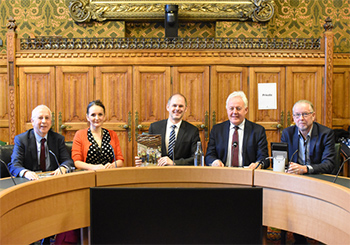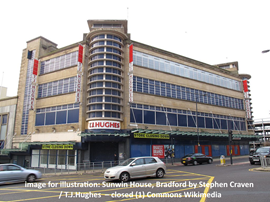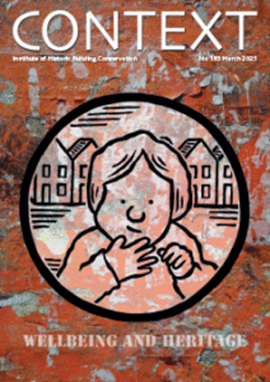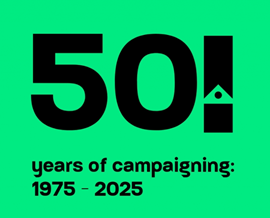MPs back targeted Listed Buildings VAT cuts & presumption against demolition
Targeted cuts in the VAT rate on listed building (LB) refurbishments and a presumption against demolition of existing properties are amongst the recommendations in the first report of the All-Party Parliamentary Group (APPG) heritage group on Conservation, Places and People(CPP), supported by the IHBC as APPG Secretariat.
David Blackman, consultant secretariat for the IHBC on the All-Party Parliamentary Group (APPG) on Conservation, Places and People, writes:
Targeted cuts in the VAT rate on listed building refurbishments and a presumption against demolition of existing properties are amongst the recommendations of a cross party Parliament heritage group’s first report.
… This inaugural report (The Value of Heritage report APPG CPP 2022)….demonstrates the value that heritage delivers to the economy, environment, regeneration and society…
The Value of Heritage report APPG CPP 2022, launched last Thursday at the House of Commons, is the result of a year-long inquiry by the All-Party Parliamentary Group (APPG) on Conservation, Places and People.
The APPG, which is chaired by James Grundy MP (Conservative), is supported by the Institute for Historic Building Conservation (IHBC).
Evidence presented to the inquiry demonstrate the economic, environmental and social value that heritage delivers.
The inquiry found that businesses, particularly those in the creative sectors, are often drawn to the distinctive character of historic buildings and neighbourhoods. They are also attracted by the cheap rents and flexible floorspaces offered by heritage buildings, like historic factories and warehouses.
The new uses businesses have found for redundant, historic factories and offices has often spurred the regeneration of peripheral former commercial and industrial, inner-city areas, like in Liverpool’s Baltic Triangle.
Supporting efforts to refurbish historic buildings would also provide a valuable fillip at a time of grave uncertainty in the construction industry, for the smaller firms that tend to focus this kind of work, the report found.
The inquiry also heard that encouraging the reuse and retrofit of heritage will help to avoid the release of the embodied carbon tied up in the materials that make up existing buildings.
In addition, the APPG heard extensive evidence about how heritage can help to provide the glue which bind communities together and help to foster stronger local identity.
Specific recommendations
The report’s specific recommendations are:
1. Exploit the UK’s new freedoms over VAT post-Brexit to introduce targeted cuts in the rate for retrofit works in listed buildings, including improved insulation and installation of low carbon heating. This would stimulate work in the repairs and maintenance sector of the construction industry, providing a valuable boost to this sector at a time when the wider economy is entering a recession. This move would also assist the UK’s efforts to cut its carbon emissions from a particularly hard to remediate section of the building stock.
2. Establish a presumption against demolition and redevelopment in order to encourage the reuse of historic buildings. Evidence submitted to the inquiry shows that so called embodied emissions, resulting from demolition and construction, are often under-estimated when assessing the carbon footprint of buildings and often outweigh the lower operational emissions, such as from heating and lighting.
3. Introduce an energy efficiency amnesty for upgrading some of the UK’s most significant historic buildings to meet the net zero goal in 2050. Some of our very oldest buildings will require extremely expensive works, which may result in unsympathetic changes, in order to comply with modern energy efficiency standards. Given the huge financial and logistical challenges that the UK faces achieving net zero by 2050, exempting the most significant and historic buildings from this wider requirement will avoid potentially damaging and expensive works to highly prized landmarks with little impact on broader decarbonisation ambitions.
4. Continue welcome recent targeted funding for improvement to the historic environment. Funding streams, like the latest round of the Levelling Up Fund confirmed in the Chancellor of the Exchequer’s Autumn Statement, should capitalise on heritage assets to create a stronger sense of place that bolsters local pride.
5. Provide local and combined authorities with greater control over levelling up and regeneration funding. Local authorities have a stronger understanding than distant Whitehall ever will of what is significant in terms of their areas’ heritage so are best placed to make decisions about how funding is directed.
Comments
James Grundy, chair of the APPG on Conservation, Places and People, said: ‘As the proud MP for Leigh in the north-west of England, I see at first-hand how some of our most precious heritage is often on the edge of disappearing for good.
‘This inaugural report by the APPG on Conservation, Places and People demonstrates the value that heritage delivers to the economy, environment, regeneration and society.’
‘It shows ways in which, rather than forming a barrier to economic growth, heritage can be a powerful tool for regenerating left behind areas.’
Responding to the publication of the The Value of Heritage report APPG CPP 2022, David McDonald, chair of the IHBC, said: ‘I am delighted to welcome this report of the APPG’s first Inquiry into the Value of Heritage. Two of its recommendations stand out for me.
‘First, establishing a presumption against demolition and redevelopment in order to encourage the re-use of historic buildings. Many of us have been saying this for a number of years, and it is such an obvious message in terms of climate change and sustainability. Second, harmonising the VAT rate between new construction and refurbishment. This would be a great incentive to building owners to improve the energy efficiency of their properties and could be a real stimulus to the economy in these difficult times.’
The Conservation, Places and People APPG has been established to champion efforts to use the conservation and regeneration of the historic environment to help deliver thriving and sustainable communities.
For any questions, please contact David Blackman at the Conservation, Places and People APPG’s secretariat on email at [email protected]
There is a separate article here on The Value of Heritage report APPG CPP 2022
See the Press Release
See full details and background HERE
See more on the CPP APPG HERE
This article appears on the IHBC news and blog site as "CPP APPG Inquiry update: MPs back targeted LB VAT cuts & presumption against demolition" dated December 9
--Institute of Historic Building Conservation
Relate articles on Designing Buildings
- Alternative futures for heritage.
- Capital gains tax.
- Cultural heritage.
- Construction VAT.
- DCMS Culture Secretary comments on HM Government position on contested heritage.
- Heritage definition.
- Heritage Action Zone.
- Heritage asset.
- Heritage at Risk Register.
- Heritage Lottery Fund.
- Heritage partnership agreements HPA.
- Heritage value.
- Marketing heritage assets.
- Stamp duty.
- Tax.
- The benefits of investing in heritage at risk.
- The Value of Heritage report APPG CPP 2022
- VAT - Option to tax (or to elect to waive exemption from VAT).
- VAT - Protected Buildings.
- What makes a heritage-at-risk officer.
IHBC NewsBlog
Old Sarum fire in listed (& disputed) WW1 Hangar - Wiltshire Council has sought legal advice after fire engulfed a listed First World War hangar that was embroiled in a lengthy planning dispute.
UK Antarctic Heritage Trust launches ‘Virtual Visit’ website area
The Trust calls on people to 'Immerse yourself in our heritage – Making Antarctica Accessible'
Southend Council pledge to force Kursaal owners to maintain building
The Council has pledged to use ‘every tool in the toolbox’ if urgent repairs are not carried out.
HE’s Research Magazine publishes a major study of the heritage of England’s suburbs
The article traces the long evolution of an internal programme to research 200 years of suburban growth
IHBC Context 183 Wellbeing and Heritage published
The issue explores issues at the intersection of heritage and wellbeing.
SAVE celebrates 50 years of campaigning 1975-2025
SAVE Britain’s Heritage has announced events across the country to celebrate bringing new life to remarkable buildings.
IHBC Annual School 2025 - Shrewsbury 12-14 June
Themed Heritage in Context – Value: Plan: Change, join in-person or online.
200th Anniversary Celebration of the Modern Railway Planned
The Stockton & Darlington Railway opened on September 27, 1825.
Competence Framework Launched for Sustainability in the Built Environment
The Construction Industry Council (CIC) and the Edge have jointly published the framework.
Historic England Launches Wellbeing Strategy for Heritage
Whether through visiting, volunteering, learning or creative practice, engaging with heritage can strengthen confidence, resilience, hope and social connections.
















